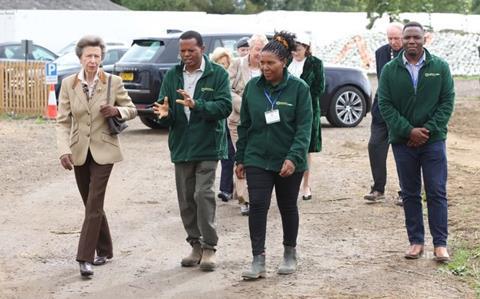David Mwanaka said royal visit was ‘highlight of career’ after building farm tenancy business around UK-grown exotic produce

Cambridgeshire exotic veg grower David Mwanaka has received a visit from Princess Anne in recognition of his work to build a business dedicated to growing produce sought by African, Asian and Latin American communities in the UK.
Her Royal Highness visited the farm last week (18 September), where she planted a peach tree to mark the occasion.
“I was the first farmer to grow white maize in the country, for a single reason, because I wanted to eat white maize,” said Mwanaka told BBC News.
“We have people come from all over for white maize, as far down as Bournemouth and some from Scotland. We also do a delivery service.”
Zimbabwean-born Mwanaka moved to the UK over 20 years ago, where he began growing vegetables from his home on an allotment. As demand for his produce increased, he began to rent small fields, before securing a 500-acre farm tenancy with Cambridgeshire County Council.
He now grows veg including white maize, along with horned melon and pumpkin leaves, which are popular with African, Indian, Vietnamese, and Mexican communities, with sales through online delivery and a farm shop.
One shopper told the BBC she drove two hours to the farm shop to buy Mwanaka’s maize. “White maize is so iconic and I can’t get it like this anywhere else,” she told the outlet.
Cambridgeshire council has over 33,000 acres of farmland, as the largest public sector estate in England and Wales, which it leases to more than 160 tenant farmers and growers, producing crops from pumpkins to peonies.
“I am very proud that Mr Mwanaka has been able to build such a dynamic and exciting business on one of our many rural estate farms,” said councillor Karen Young, chair of the assets and procurement committee.
“What a fantastic testament to his hard work that it has attracted the interest of Princess Anne. We never underestimate the importance of our farmers and their contribution to the wider community. They provide a real boost to the local economy and make a huge contribution to improving the biodiversity of our natural environment,” she added.
“It was really a highlight of my career to have her come to encourage, support and watch,” Mwanaka told the BBC.



